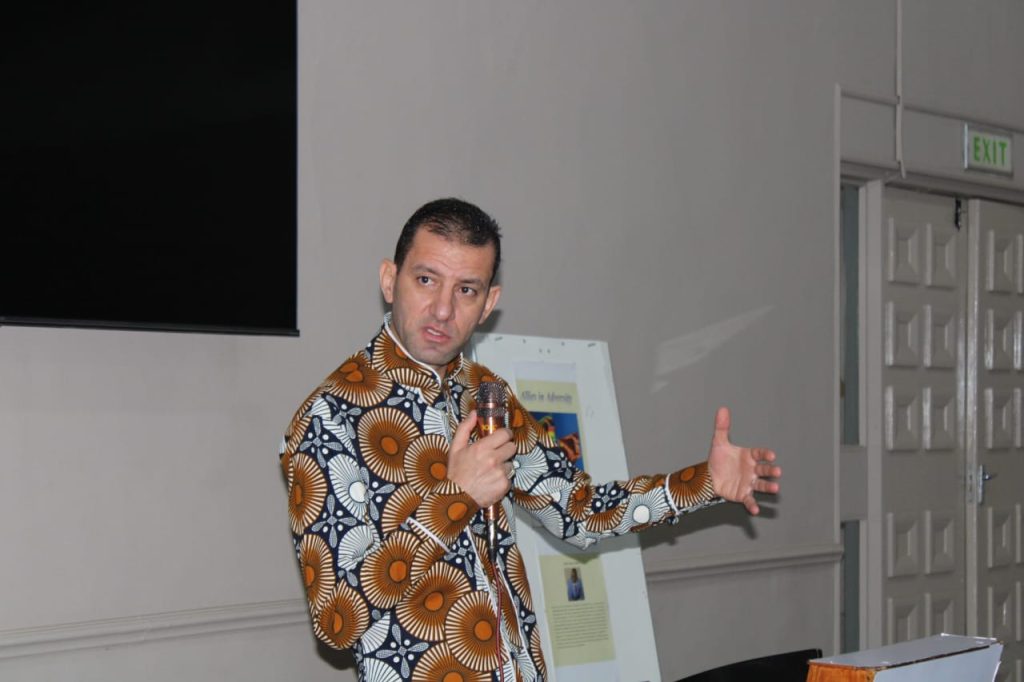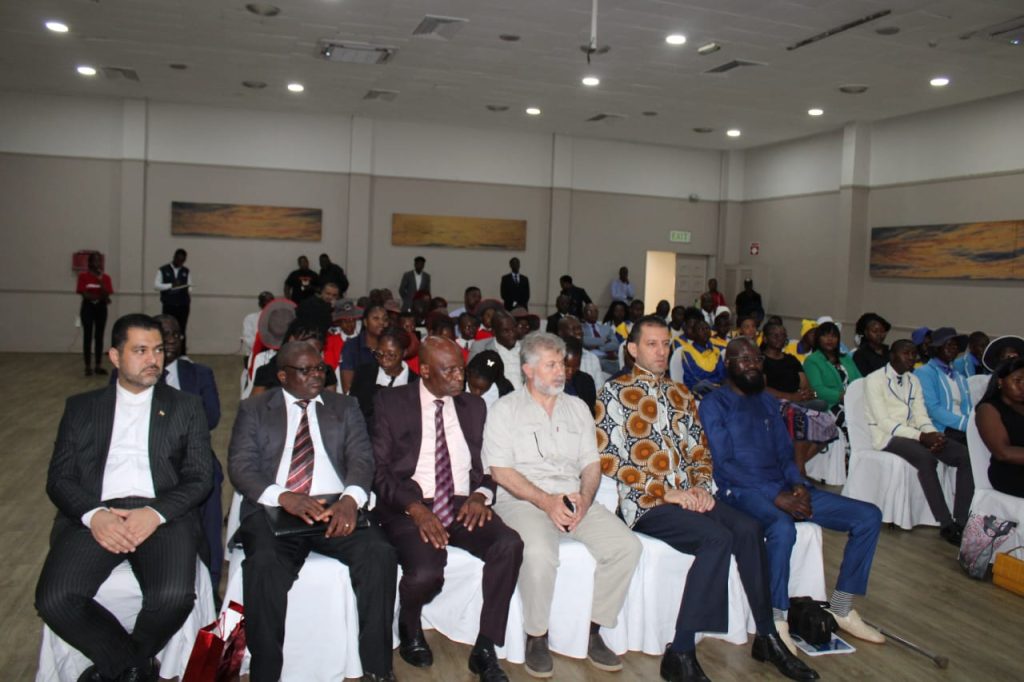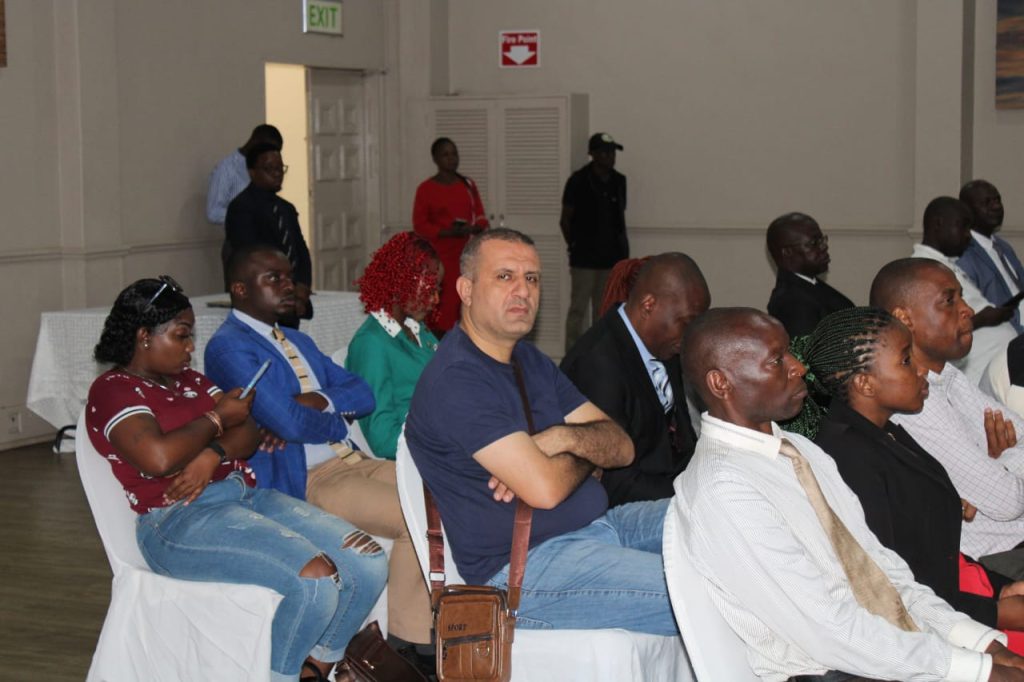
Ambassador Tamer Almassri addresses an Anti-Sanctions gathering at a local hotel in Harare
By George Swarei
Harare, 25 October 2024 – Addressing an Anti-Sanctions Day function held at the Cresta Jameson Hotel in Central Harare, Dr. Tamer Almassri, the Ambassador of the State of Palestine to Zimbabwe, expressed strong solidarity with Zimbabwe in its ongoing battle against sanctions. Speaking to an audience of diplomats, officials, and civil society representatives, Dr. Almassri underscored the shared experiences of Palestine and Zimbabwe in facing economic hardship under external pressures, highlighting the devastating impact of sanctions on both nations’ development and human rights.
“The State of Palestine and its people extend their heartfelt solidarity with the Republic of Zimbabwe as SADC commemorates Anti-Sanctions Day. The Palestinian people have a deep understanding of the devastating impact of illegal sanctions, having faced occupation and apartheid policies for close to a century under Israeli colonialism,” said Dr. Almassri.

Ambassador Almassri among delegates…
Beyond Palestine, various international actors have raised their voices against the sanctions imposed on Zimbabwe, citing their negative impact on the country’s economy and its ability to engage in international business. These sanctions, particularly those imposed by Western nations, have restricted Zimbabwe’s access to international credit lines and foreign investment, hampering economic growth and increasing the difficulty of doing business in the country.
The African Union (AU) has consistently condemned sanctions against Zimbabwe, calling for their immediate removal. In its statements, the AU has argued that sanctions undermine Zimbabwe’s economic sovereignty and create artificial barriers to development. This sentiment was echoed by South African President Cyril Ramaphosa, who has called for an end to the “unjustified” restrictions, stating that sanctions are not only harming Zimbabwe but also the broader SADC region.

School children attend the Anti-Sanctions day in Harare
In 2023, Russia and China, key players on the global stage, voiced their strong opposition to the sanctions. Russia’s Foreign Ministry condemned the “economic strangulation” of Zimbabwe, while China’s government has repeatedly called for the lifting of sanctions, citing their detrimental effects on Zimbabwe’s ability to attract investment and participate in global trade. China’s Foreign Ministry spokesperson described the sanctions as a “violation of Zimbabwe’s right to pursue independent development.”
The United Nations Economic Commission for Africa (UNECA) has also criticized the sanctions, emphasizing that they have isolated Zimbabwe from the global financial system, cutting off the country’s access to crucial credit lines from multilateral institutions like the World Bank and the International Monetary Fund (IMF). These restrictions have resulted in a scarcity of foreign currency, making it difficult for Zimbabwe to finance essential imports and meet its debt obligations.

Sanctions have severely impacted Zimbabwe’s business environment, particularly in terms of securing international credit and fostering foreign direct investment (FDI). The Zimbabwe Democracy and Economic Recovery Act (ZIDERA), enacted by the United States in 2001, remains one of the most significant sanctions regimes. Under ZIDERA, U.S. financial institutions are prohibited from engaging in financial transactions with Zimbabwe, and the country is barred from receiving debt relief and new credit from international financial institutions like the World Bank and IMF. This has led to a sharp decline in Zimbabwe’s access to international capital markets.
The sanctions have also resulted in Zimbabwe’s exclusion from the African Growth and Opportunity Act (AGOA), a U.S. initiative designed to promote trade and investment in African countries. Being left out of AGOA has meant Zimbabwe is unable to benefit from preferential access to U.S. markets, which could have supported its key export sectors such as agriculture and textiles.
Moreover, the European Union (EU) imposed its own targeted sanctions on Zimbabwe in the early 2000s, which included asset freezes and travel bans on senior officials. While the EU has gradually lifted some of these measures, the legacy of these sanctions has left Zimbabwe with a tarnished international reputation, further complicating efforts to reengage with global financial markets and investors.
The World Bank and IMF have been unable to extend loans to Zimbabwe due to the country’s failure to clear arrears, a situation exacerbated by sanctions. Without access to multilateral credit lines, Zimbabwe has turned to bilateral creditors, often under less favorable terms, deepening its debt burden and stifling economic growth.
Dr. Almassri emphasized that sanctions amount to collective punishment, with millions of innocent Zimbabweans bearing the brunt of these economic restrictions. “We stand in unwavering support of Zimbabwe’s resilience in the face of unjust sanctions. These measures have done nothing but deepen tensions, harming millions of people while achieving no productive outcomes,” he said.
Drawing on Palestine’s own experience with international sanctions, the Ambassador noted that these measures often lead to increased economic hardship, humanitarian crises, and violations of fundamental human rights. “The international community must come together to prevent the world from becoming a battleground for economic warfare,” he urged.
As Zimbabwe continues its efforts to navigate these challenges, the global support demonstrated on Anti-Sanctions Day serves as a reminder of the broader consensus against punitive economic measures. Nations like Palestine, South Africa, China, and Russia have called for a reevaluation of these policies, arguing that they hinder development and exacerbate poverty rather than fostering solutions.
SADC Anti-Sanctions Day, observed on 25 October each year, provides a platform for regional and international actors to voice their opposition to the continued imposition of economic sanctions on Zimbabwe. The global solidarity expressed, including from Palestine, highlights the shared struggles of nations facing economic isolation and their common desire for sovereignty and economic independence.
While Zimbabwe’s resilience remains a testament to its people’s strength, the calls for the removal of sanctions continue to grow louder, urging a new chapter of engagement and growth for the nation.
